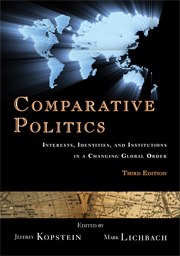Book contents
- Frontmatter
- Contents
- List of Maps
- Preface to the Third Edition
- List of Contributors
- 1 What Is Comparative Politics?
- 2 The Framework of Analysis
- PART ONE EARLY DEVELOPERS
- PART TWO MIDDLE DEVELOPERS
- PART THREE LATE DEVELOPERS
- PART FOUR EXPERIMENTAL DEVELOPERS
- 9 Mexico
- 10 India
- 11 Iran
- 12 South Africa
- 13 The European Union
- 14 Nigeria
- STOP AND COMPARE
- Index
- References
9 - Mexico
from PART FOUR - EXPERIMENTAL DEVELOPERS
- Frontmatter
- Contents
- List of Maps
- Preface to the Third Edition
- List of Contributors
- 1 What Is Comparative Politics?
- 2 The Framework of Analysis
- PART ONE EARLY DEVELOPERS
- PART TWO MIDDLE DEVELOPERS
- PART THREE LATE DEVELOPERS
- PART FOUR EXPERIMENTAL DEVELOPERS
- 9 Mexico
- 10 India
- 11 Iran
- 12 South Africa
- 13 The European Union
- 14 Nigeria
- STOP AND COMPARE
- Index
- References
Summary
Introduction
January 1, 1994, will be remembered as an important date in Mexican history. As Mexicans celebrated the beginning of the new year, two events occurred that marked profound changes in the country's political development and would eventually lead to a significant shift in the country's balance of political power. First, the North American Free Trade Agreement (NAFTA) took effect. This treaty integrated Mexico's economy more closely with those of the United States and Canada, marking the end of a nearly seven-decade strategy of sheltering Mexico from the vagaries of global markets. Pressures from international investors and trading partners to create greater economic openness dramatically affected (and continue to affect) Mexico's domestic institutions and day-to-day politics. The day's second memorable event made this readily apparent. As Mexico's President Carlos Salinas de Gortari was celebrating the new year and the implementation of NAFTA at a cocktail party, he received word that a major guerrilla insurgency had erupted in the southern Mexican state of Chiapas. A revolutionary organization known as the Zapatista National Liberation Front (EZLN) (or Zapatistas) was demanding greater political participation and a solution to the dire economic plight of poor rural farmers.
That the guerrillas attacked on the same day NAFTA took effect was no accident: The Zapatistas considered Mexico's increased integration into the world economy a threat to the economic well-being of the majority of Mexico's rural population, most of whom are of indigenous origin.
- Type
- Chapter
- Information
- Comparative PoliticsInterests, Identities, and Institutions in a Changing Global Order, pp. 318 - 365Publisher: Cambridge University PressPrint publication year: 2008



